#because birth control is fallible
Explore tagged Tumblr posts
Note
Your local pharmacy technician here.
The medication is called Isotretinoin, aka Zenatane, Amnesteem, or Claravis.
It can cause severe birth defects, which is why it's required for patients to be on birth control if they have a uterus and to be repeatedly educated on the risks of the medication. To be fair, men on the medication also have to be repeatedly educated on not having unprotected sex while on it.
It has, iirc, a 30% chance of causing birth defects in infants. You have to understand that this is extremely high for any medication on the market. Compare that to fetal alcohol syndrome, which, if I did my math right, is something like a 7% chance of happening when drinking alcohol while pregnant, although numbers vary. That's a significant difference.
There are many, many medications that could, theoretically, potentially cause problems for a baby if taken during pregnancy, but they don't have a THIRTY PERCENT CHANCE of causing birth defects.
I'm seeing people in the notes calling this dystopian, but, frankly, the ipledge system requiring people to prevent pregnancy while on this medication is the only way this medication could have made it to the market. It's nearly a 1 in 3 chance of causing birth defects.
Part of the reason there are these measures put in place is because, on a grand scale, you just can't take "I pinkie promise" from patients as any kind of guarantee. You just can't.
I know it's incredibly frustrating, but imo the solution is for more medications for acne to be available and/or more birth controls to be available so that there are more options.
It would be criminally irresponsible to put isotretinoin on the market without some sort of stopgap in place.
If it was really about "but what about the babies?", believe me, there would be so many more medications attached to the ipledge system. It would be a logistical nightmare and impractical to boot, even ignoring the moral implications.
Please believe me when I say there's a good reason isotretinoin has the ipledge system. It literally wouldn't be available at all without it. I am directing this message less to anon and more to conspiratorial commenters on this post.
You know what medical pet peeve, I kind understand it but I still find it stupid and hate it. There's this medication I wanna try for my skin, but I can't use it unless I use birth control. I forgot the English name, sorry. Literally I cannot get it unless I'm on birth control and actively taking it, even though I don't fuck, I don't do casual sex and I am not dating, I'm completely soloing life. Ok? I would also have to piss in a cup each month to prove I'm not pregnant. I can't get the medication unless I take birth control because when pregnant it's bad for the fetus. A fetus I'll not have because I don't fuck, and have no interest in it, and I also in my current position and maybe future, just do not want children.
I can't fucking take birth control because all of the ones I tried leave me completely destroyed mentally and physically, I just don't have the body for any birth control. They make literally everything worse, bloating, nausea, periods, weight fluctuation, itchy for some reason, one even made me leak and then my breasts got so badly inflammed wearing a shirt was agony, etc. The medication I want to take isn't the best for general health either: Dry skin, liver, some other shit. I fucking hate it, I either have to just not do the medication, or I have to completely ruin my health in two ways because of a pregnancy that is just is not going to happen because I don't fuck.
I am guessing this is because of people lying about their sexual activity or some shit, but for the love of everything, now I can't get the medication that would actual improve my quality of life because of these people. I think what got me the most is that the Doctor I spoke to said that even if a woman doesn't have the ability to have children she would still need to take birth control and piss in a cup.
--
#your local pharmacy technician#please i am begging you#there is an actual medical reason for this#30% is insane you dont understand#its probably only available at all because it doesnt cause infant mortality like thalidomide did#is it super frustrating?#yes#but can you imagine if they didnt have the ipledge system in place#the amount of people who would give birth and have babies with birth defects would be insane#and then people would turn to the medical establishment#and ask why they didnt prevent this#had they learned nothing from thalidomide?!#and the medical community would say#well we tried to educate people#and everyone would agree that that wasnt good enough#because clearly just education didnt prevent this from happening#because birth control is fallible#people are fallible#even in the best of circumstances and assuming no patient ever lied about preventing pregnancy#there would still statistically be a number of people who would get fucked over#like 5 million americans are on this medication#lets assume half of them have a uterus#hormonal birth control has a failure rate of 7% for a variety of reasons but mostly human error iirc#if i did my math right thats 175000 unplanned babies#thats 52500 babies born with birth defects in one year#and thats when people decide to go on the med even with the current red tape#statistically speaking that number would only grow if there was no ipledge system#reply
781 notes
·
View notes
Text
an analysis of the joker in batman: lovers & madmen, pt. IV
[ <- pt. III ]
i'm finally back with more jack! this is one of my favorite chapters, as it gives birth to the joker in all his twisted glory. so let's dive further into it! spoilers ahead
short recap: with batman's assistance and strong encouragement, maletesta (jack's very angry former employer) kidnaps him right when he's about to undergo surgery, precisely because of the batarang-inflicted wound. so, as you may notice, there are many things going on.
first, batman is deliberately staying away from the action. this isn't just because he doesn't want anything to do with it, but because he needs to remain ignorant in order to believe it was the right, moral thing to do. as long as he doesn't know about the actual violence committed against jack, he can justify his decision as the lesser evil, and himself as gotham's ruthless protector.
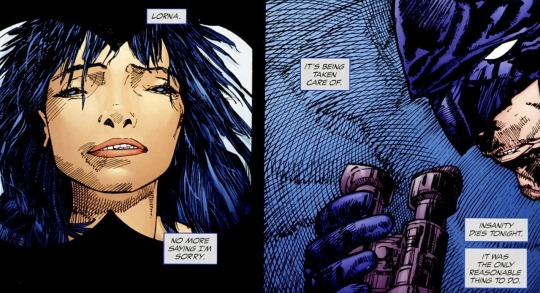
this reads to me as an attempt at portraying his own decision as batman's, not bruce's, in order to feel more in control. because if it's batman's, it has to be morally correct, a sacrifice for the greater good. if it's bruce's, however, he has to face that it can be fallible. and in this case, it very much is—bruce has let grief, anger, and fear drive his actions, and in doing so has broken his own moral code.
in the meantime, maletesta and his gang have taken jack to an eerily familiar chemical factory. we're introduced to his underlings, a group of thugs who are implied not to have a bone to pick with jack, but are still happy to have some fun at his expense. all of them except for tub, a man who repeatedly suggests ending things quickly and painlessly.
and the last thing going on? jack has been perfectly awake the whole time, and still his greatest concern remains how awfully predictable all of it is, rather than the torture he's been enduring.

he despises their dishonesty and the empty performance of their violence. because they use it as a tool to gain respect and reaffirm their identities. and worse—they aren't even good at it! as jack puts it, he has received far worse from his mother (once again, this points at a history of abuse and violence starting in his early days.)
despite having been subjected to a brutal beating, jack doesn't relent and even threatens the gang. i think his behavior isn't a sign of bravery or recklessness, but a consequence of jack's core belief—namely, the idea that as much as he'd like to die, the universe just won't allow it.
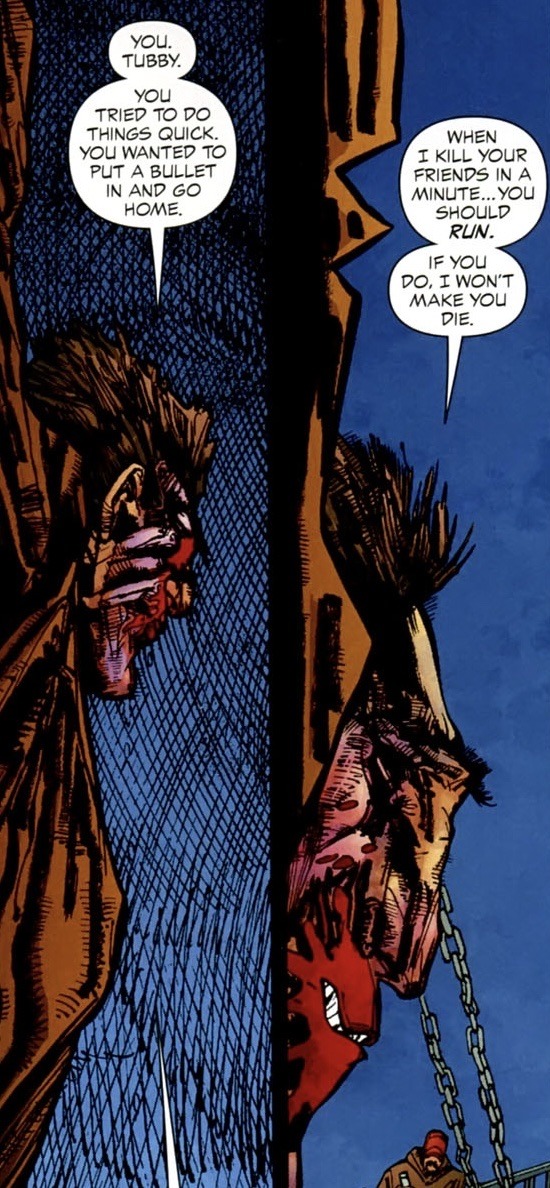
another thing that piques my interest is jack’s warning to tub. similar to his behavior with harleen (he repays her kind words by anonymously paying off her debts), he spares tub's life because he wanted to get things done without indulging in violence.
so, despite what could be seen as a general lack of a moral code, jack consistently notices and rewards acts of goodness. interpretations may vary, but my personal take is that jack greatly respects the ability to remain kind in what he knows is a harsh world, and wants to preserve this kindness in whatever way he can.
speaking of moral codes, guess who's already regretting his decision to facilitate a murder? despite his initial attempts at justification, batman can't go through with it—he desperately wants to be rid of jack, yes, but not like this. not if it means sacrificing his soul in the process.

as batman makes it to the factory, jack makes good on his threat and takes out every member of the gang but tub. rather than be happy about it, jack once again becomes desperate at his apparent inability to die, even verbally lashing out at the thugs for their incompetence. in response, and to batman's dismay, maletesta fires one last bullet straight to jack's head
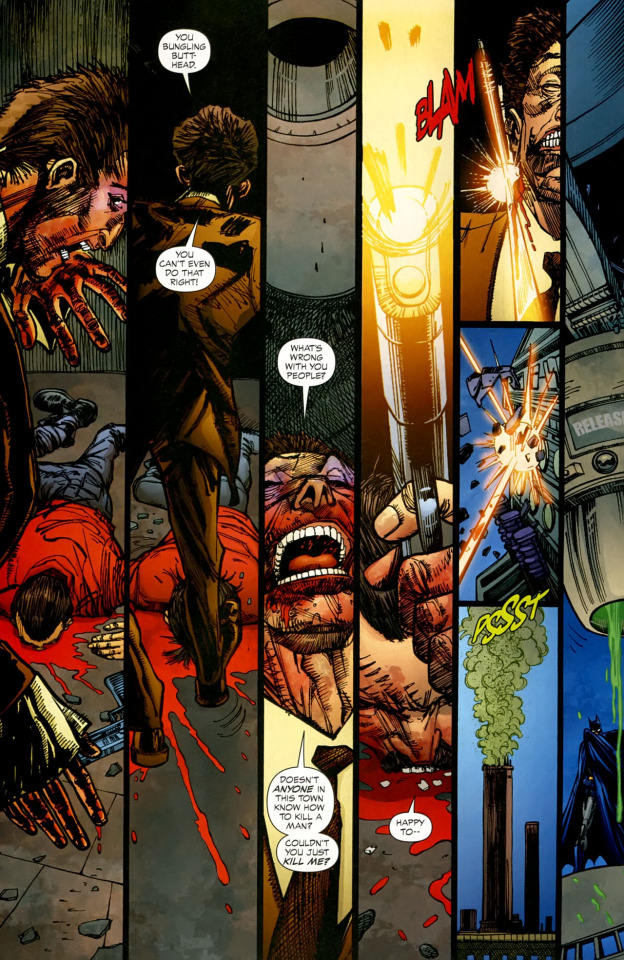
except it misses. barely. but still, enough to spare jack's life.
right before he gets engulfed by a flood of chemicals, too late for batman to save him.
while he's trapped in there, jack thinks about it with detached resignation. he can hold his breath better than average, but he's aware, eventually, he's just going to die. and isn't that what he wanted?
turns out, he doesn't. even if it's just instincts, jack realizes a part of him still wants to live, because when the bullet came, he dodged it.
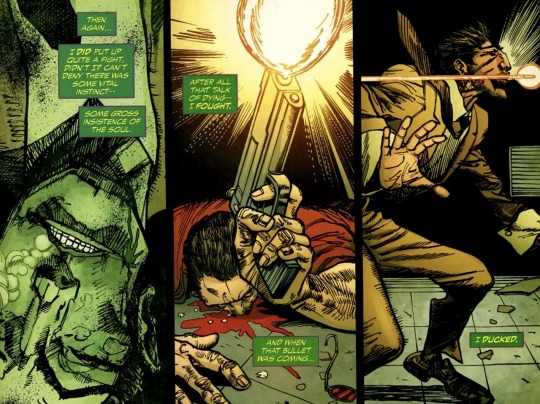
he supposes that should count for something.
faced with such a life-altering revelation, he needs an anchor—something, or someone, to hold on to now that his world view is shattered. and what's the closest thing to meaning he has ever encountered?
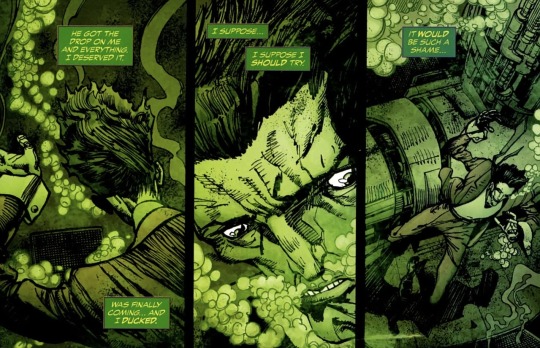

in his own words,
it would be such a shame... never to see him again.
to clarify, i do think jack would have fought for his life either way, regardless of batman being there or not. but his presence serves as a reminder of what jack desires most—a formidable opponent and endless entertainment.
so jack fights, and he finds a way out, only he emerges as a changed man.
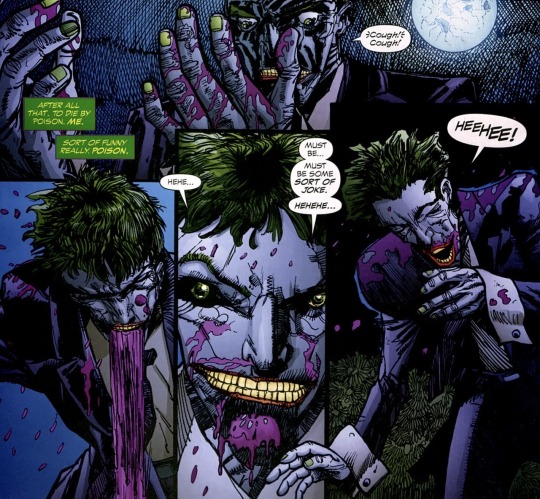
(i'd argue he's not that changed, but that will have to wait for the next part)
noticing his physical changes and symptoms, he thinks he's dying. and somehow, that is what truly breaks him—not that he'll die by poison, but that he'll die right after realizing how badly he wants to live. it's the universe's last joke at his expense, and he's finally laughing.
[ pt. V -> coming soon ]
#the joker#batman lovers and madmen#batman confidential#batjokes#batman#batman universe#batman x joker#batman comics#character analysis#queer interpretation#joker character study#🃏🖋️
16 notes
·
View notes
Text
Hozier and romanticizing Ireland, or why the “bog man” shtick should be dropped back into the bog from whence it came
So after a slapdash, frustrated post about the politics of Hozier's music went batshit yesterday, I wanna do a quick follow up about the whole bog man thing, which multiple people mentioned in the reblogs and tags.
Artists are usually known by their names, either the one they got at birth or the one they picked for their career. Beyoncé Knowles Carter goes by Beyoncé, Stefani Germanotta goes by Lady Gaga, Taylor Swift goes by Taylor Swift, etc.
Andrew Hozier-Byrne goes by the stage name Hozier. When talking about him online, most people just call him Hozier, or sometimes Andrew for emphasis or to be silly. Then you have the people who call him stuff like this:








Yeahhhhhhhh, that's just some of what I found in like a 5 minute search. If you search tumblr for "bog man" or "forest daddy" it's almost all posts about Hozier; there's a lot more (and weirder) if you go look on TikTok.
People from other countries romanticizing Ireland isn't new, but that doesn't make it acceptable. Ireland is very much a modern country with modern problems, despite media (mostly American) which prefers to focus on Ireland as an exotic, idealized land, a postcard from the past where everyone lives in cottages and dresses in green and only speaks in mysterious rhyming couplets. Heck, only 3 in 10 Irish people live in rural areas. The other 7 in 10 live in urban or suburban areas, including Hozier. He lives in County Wicklow, which is quite close to Dublin, a city of over 500,000 people and also Ireland's capital.
Like, I'm not saying anyone is The Devil for making a couple "bog man" cracks. God knows I made a few of them back in 2019; one of my old posts makes me cringe because I joked about Hozier and fairy mounds. And you can find old examples of Hozier humoring the gag here and there, whether because he found it funny at the time or because he was just playing along.
Lately, though? When the bogfather/fae king stuff comes up in interviews, Hozier seems uncomfortable with it, even though he stays polite:
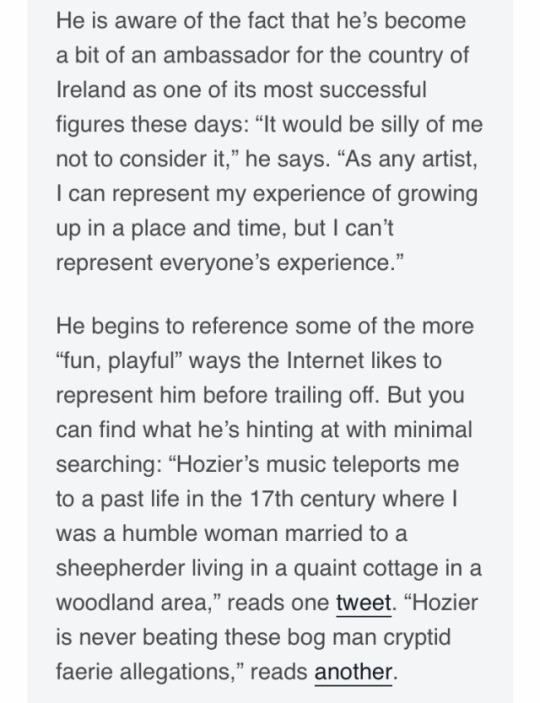
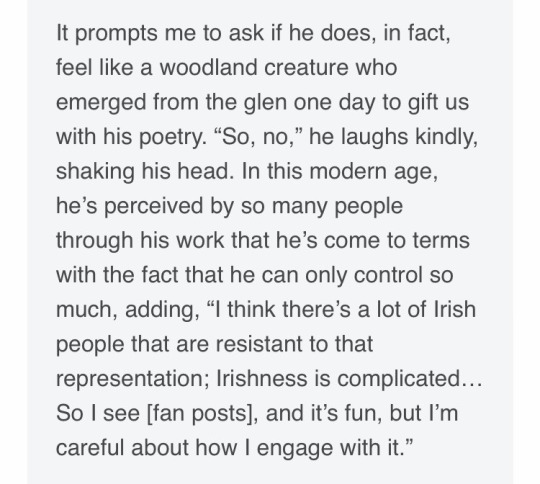
Like. Hozier is just a guy. A dude named Andrew who sings and plays guitar and writes songs and is a fallible human being. Artists can't completely control their image, but if you're a fan of someone's music, you should try to treat them as a person, not a mythical creature or a bundle of stereotypes about their country or a flawless statue to be stuck up on a pedestal.
All of us (including me!) fuck up sometimes. But once we know better, we should choose to do better.
#hozier#andrew hozier byrne#unreal unearth#bog man#forest daddy#I did NOT expect my prior post to blow up#rip my notifications
282 notes
·
View notes
Note
https://www.tumblr.com/aventurineswife/781910538025353216/hello-so-we-talk-about-the-comedic-side-of-the?source=share
About angsty side, how about a version where creator isn't causing them all of this pain by intention?
Like, for example, they could a being who created omniverse by dreaming, absolutely everything (universes, multiverses, omniverses, matter, energy, space-time, dimensions, forces, soul, mind, life, death, logic, realities and it's different aspects like different laws/workings, destiny and fate, magic, science, concepts, etc.) and whatever is beyond comes from their dreaming, but they don't lucid dreaming (have no self-awareness and doesn't control how everything would turn out), that way sometimes unintentionally destroying some of worlds and causing pain along with suffering to others.
Oh wow, yes — that concept you’re proposing hits even deeper in a way that's hauntingly beautiful.
You're taking it from simple tragedy into existential sorrow — cosmic loneliness — without making the Creator cruel or villainous at all.
The Creator/Reader didn't choose to hurt anyone.
The omniverse exists because the Creator dreams.
Their existence causes reality to be.
They don't control their dreams — they simply are.
Sometimes those dreams birth new worlds, new lives, new miracles...
But sometimes, dreams become nightmares.
And without meaning to, they create suffering, disasters, even extinction.
It's never intentional. They never wanted to bring pain.
They literally can't help it.
The Price?
The Creator suffers, always half-aware of the horrors happening within their dream, but unable to wake up.
Even when fragments of them "visit" the worlds (like when the Reader appears), they're just echoes, barely a sliver of the true self, acting instinctively out of care.
They can't fix everything because to fix one thing would shatter a thousand others.
Reality is too delicate, too interconnected.
They endure the guilt of it all in silence, because what else can they do?
How the Characters Would React:
Characters who were angry or resentful (Scaramouche, Aventurine, Blade, Jingliu) would have their rage utterly collapse into raw grief.
They weren't forgotten — they were created and loved even when the Creator was powerless to intervene.
Characters who understood loss (Zhongli, Ei, Venti, Welt Yang, Fu Hua) would grieve harder than ever.
Because they know the agony of helplessness, and now they realize their Creator has lived it multiplied by infinity.
Even characters who tried to be cold or logical (Otto, Dottore, Cocolia) would feel it deep inside — that unrelenting isolation, that yearning for a perfection that can never exist.
They would realize the Creator is lonely not because they are above them, but because they are trapped below them — within their own endless dream, forever chained by their own existence.
It shows that true love isn't about fixing everything.
It's about choosing to exist, choosing to continue dreaming, even knowing you will cause pain — because without you, there would be nothing at all.
The Creator/Reader is the most human figure imaginable:
Fallible.
Gentle.
Trying their best even when they can't fix everything.
And that...
That makes the Reader the most beautifully tragic and irreplaceably precious being across the omniverse.
8 notes
·
View notes
Text
Fixing TUE Part 4.5--Clockwork and the Observants Headcanons
Welcome back to my analysis of The Ultimate Enemy. Anyone who wants some juicy Clockwork lore, welcome! I've criticised his canon portrayal in Part 4, so here we are onto the changes!
(Part 4), Part 4.5, (Part 5)
I’m not entirely sure on how I'd change the events of The Ultimate Enemy itself—but I can spitball some ideas for background lore of what Clockwork is, what he's capable of and how he works. Establishing limits/profiles of Clockwork’s power, knowledge or moral compass to help guide how his character would act in a rewrite.
Idea one: Limit Clockwork's knowledge. He can only see time by viewing the time window, and has the ability to gain knowledge in real time. He's distinctly fallible.
Idea two: We could limits Clockwork’s power to act on his knowledge by saying that his existence happens outside of normal time—and mixes with it like oil and water. Perhaps his tower/lair is a rift in time, the temporal dimension bleeding into the Ghost Zone—so it’s sort of a “negative space” compared to normal time. Rather than his “Time Outs” being just a tool to manipulate time…it’s his only means of navigating the flow of normal time itself. He can interact with normal time only by existing in these moments “in between”.
The amulets allow him to bring other elements or people from regular time into this “gap in time” to talk to them, but he has limited power outside of communicating with them during these time-outs so they can act in his stead. Hence, why he relies on other ghosts to do his dirty work.
The only problem is, of course, that would still leave the question of “Why not inform the other characters of Dan’s origin story?”, “why not get other characters to interfere with the birth of Dan” and “why not just bring Dan outside of time to fight or contain him?”…but I don’t have answers for that just yet.
Idea Three: Alter Clockwork's intentions, morality or free will. For example, what if Clockwork wasn’t a ghost in control of time, or a master of time, but literal time itself?
That is, he was less of a person and more of a force of nature. As if the rift in time, which created his tower, leaked energy in the Ghost Zone until it gathered enough ectoplasm to create an avatar for itself. Clockwork is time’s ghostly extension, or an extra limb…or if time itself had its hands up the back of an ectoplasmic sock puppet, making it talk.
Time itself could be a primeval or fundamental force. But just like in real life, it’s not a person. It doesn’t really have thoughts, or feelings, or free will/agency to act on its own behalf. Time…simply is. It just exists. It just…happens the way it does. If time is a program, Clockwork could be like the holographic interface or pop-up window telling the user what’s going on in the OS. An ectoplasmic AI which has learned how ghosts communicate, but isn't as self-aware.
So, we have an interesting twist on the age-old “wise master of time refuses to interfere because they want to be responsible” trope (like the Time Lords from Doctor Who). It's not that there's some "grand plan". Clockwork’s lack of proactivity to change things optimally is because he is the avatar of time. And time just is--it doesn’t try to change itself. Heavy attempts to alter time are a very human…or…ghost thing to do.
This could be why the Observants are the ones who prompt him into action. Perhaps the Observants were the ghosts to discover time travel, and to whatever extent that they have manipulation over time, they have control over Clockwork. They’ve given up on interfering and instead prompt Clockwork to do their bidding.
If we wanted him to have character development, we could have him gradually gaining more "humanity" as he interacts with Danny. Or maybe the Observants' control stunted the development of Clockwork's ghost as his own person, and Danny releases him.
Or perhaps he already has some level of personhood/his own mind as his own ghost, but since he’s still connected to time itself he has limited free will—he is still largely directed by the whims of fate. Though you would have to establish that some sort of fate exists.
Idea three: This is another limitation or weakness that revolves around Clockwork more as a thinking person than the face of an unthinking force. It’s inspired by the Bootstrap Paradox.
Clockwork, as someone who (in canon) can both affect the events of the timeline AND see future outcomes in the time window…should be theoretically able to see timelines/events that result from his own actions, before he gets the idea of what to do. Either he could see what he does, or the results of what he does and infer what he did in his own relative future.
But if Clockwork only knows what to do, because he saw it (or could only deduce what he’d done) in the results in the time window… He didn’t realise it by himself, but was affected by the information of how his future alterations would affect time—he watched what he would do, and knew what to do from there. And the only reason his future self would’ve done that would be because he saw it in the time window too. In that case, where would Clockwork’s ideas have come from? How much free will did Clockwork have?
Which is why I propose the idea that Clockwork can see the results of others’ decisions in the time window, but not his own. He can see what everyone else can do, but not what he can as a being outside of normal time. He has to predict the results of his actions the way a normal person has to rely on guesswork, but with more intelligence involved.
This wouldn’t excuse stupid actions like giving Danny the CAT answers, since he’d still be highly intelligent or wise, but he at least wouldn’t be already know the impacts of his own choices before he makes them. It gives him more wiggle room to potentially fail, or be surprised by Danny’s choices and humanity. Things could have a viable reason to take him off-guard.
#danny phantom#the ultimate enemy#danny fenton#danny phantom clockwork#tue analysis#dp rewrite#10 dp episodes with missed potential#here have some clockwork lore
22 notes
·
View notes
Text
It’s like so humiliating the way people treat you when you have a uterus. But what about your potential unborn baby!!!! Does not matter to them that I’m not having penis-vaginal sex and that I’m on birth control, even the chance that you can become pregnant they will automatically give you a pregnancy test. It’s just humiliating I’m a person listen to me I’m an individual ! I know it’s because people lie about not having sex and birth control is fallible. But why is it that suddenly my autonomy doesn’t matter anymore because there’s a potential “unborn baby”. ITS CALLED A FUCKING FETUS. Fuck that potential unborn baby I don’t give a shit if it has birth defects or not I’d abort it either way. It’s my life it’s my body
Don’t reblog !!
6 notes
·
View notes
Text
The Evolution of Trust: From Institutions to Protocols

Trust isn’t just a nice-to-have; it’s the invisible engine behind every society, every system, and every single human interaction. From the earliest days of tribal living to the sprawling financial empires of today, trust has been the bridge between uncertainty and action. But what happens when that bridge starts to crumble?
We are living through a quiet revolution. Not one of bullets or protests, but one of code. And at the center of it stands Bitcoin, the first monetary system where trust isn’t outsourced, but embedded in the protocol itself. To understand why that matters, we have to trace the journey of trust itself.
Tribal Roots: Skin in the Game
In early human tribes, trust was visceral. You trusted your neighbor because you knew them. Betrayal had consequences. You couldn’t ghost a tribe and start fresh. This kind of trust was built on proximity, shared experience, and the very real risk of exile or punishment.
It was personal. It was sacred. And it worked, until scale demanded something more.
Scaling Trust with Institutions
As societies grew, we needed scalable systems of coordination. Enter institutions. Governments, religious authorities, banks—all arose to act as intermediaries of trust. These entities said, “We’ll handle this. You can trust us.”
And for a while, it worked. Trade flourished, laws stabilized, wealth accumulated. But with centralized power came inevitable flaws: greed, corruption, censorship, inequality. Trust became a commodity. A business. A tool of control.
The Fracture Point: Institutional Decay
Now we live in a world where institutions are cracking under their own weight. Politicians lie. Banks gamble with your future. Corporations prioritize profit over truth. Faith in centralized systems is eroding fast.
People feel it. They see the fine print, the double standards, the rigged rules. They’re not just losing trust in institutions. They’re losing the very concept of trust itself.
But what if trust didn’t have to be personal? What if it didn’t require faith in fallible humans? What if we could design trust into the system?
Enter Open-Source: Trust in Transparency
That’s where open-source steps in. Open-source software is radically transparent. Anyone can inspect the code, propose changes, or fork it entirely. It doesn’t ask for your belief. It shows you the blueprint.
You don’t trust a corporation. You don’t trust a spokesperson. You trust the protocol because you can verify it for yourself.
Linux: The Silent King of the Digital World
Want proof that open-source works? Look at Linux. It’s the operating system powering most of the internet. It runs on servers, supercomputers, phones, and even space tech. Most people use Linux-based systems every day without even knowing it.
Linux didn’t win because of flashy marketing. It won because it worked. Because people could see it, improve it, and build on it. That’s the quiet power of transparency.
Bitcoin: The Apex Evolution of Trust
Now take that same open-source model and apply it to money. That’s Bitcoin.
No CEO. No central bank. No backroom deals. Just open-source code running on thousands of nodes around the world, enforcing the same transparent rules for everyone. You don’t need to ask permission. You don’t need to trust anyone. You can audit the entire system yourself.
Bitcoin is what happens when we stop trusting banks to hold our wealth and start trusting math, consensus, and time-tested code.
It’s not just a financial tool. It’s a trust protocol.
A New Trust Paradigm
We’re witnessing the birth of a new form of trust. One that doesn’t rely on authority figures or legacy institutions, but on protocols that anyone can audit, challenge, and improve.
Bitcoin isn’t here to destroy trust. It’s here to upgrade it. To take it out of the shadows and into the light. To give it back to the people.
This isn’t about going backward to tribalism. It’s about going forward to something more resilient, more open, more human. Because it’s built by humans, for humans, without needing to trust any single one of them.
Welcome to the new trust economy.
Bitcoin is the proof.
Take Action Towards Financial Independence
If this article has sparked your interest in the transformative potential of Bitcoin, there’s so much more to explore! Dive deeper into the world of financial independence and revolutionize your understanding of money by following my blog and subscribing to my YouTube channel.
🌐 Blog: Unplugged Financial Blog Stay updated with insightful articles, detailed analyses, and practical advice on navigating the evolving financial landscape. Learn about the history of money, the flaws in our current financial systems, and how Bitcoin can offer a path to a more secure and independent financial future.
📺 YouTube Channel: Unplugged Financial Subscribe to our YouTube channel for engaging video content that breaks down complex financial topics into easy-to-understand segments. From in-depth discussions on monetary policies to the latest trends in cryptocurrency, our videos will equip you with the knowledge you need to make informed financial decisions.
👍 Like, subscribe, and hit the notification bell to stay updated with our latest content. Whether you’re a seasoned investor, a curious newcomer, or someone concerned about the future of your financial health, our community is here to support you on your journey to financial independence.
📚 Get the Book: The Day The Earth Stood Still 2.0 For those who want to take an even deeper dive, my book offers a transformative look at the financial revolution we’re living through. The Day The Earth Stood Still 2.0 explores the philosophy, history, and future of money, all while challenging the status quo and inspiring action toward true financial independence.
Support the Cause
If you enjoyed what you read and believe in the mission of spreading awareness about Bitcoin, I would greatly appreciate your support. Every little bit helps keep the content going and allows me to continue educating others about the future of finance.
Donate Bitcoin:
bc1qpn98s4gtlvy686jne0sr8ccvfaxz646kk2tl8lu38zz4dvyyvflqgddylk
#bitcoin#decentralization#opensource#linux#trust#web3#money#cryptocurrency#financialfreedom#digitalsovereignty#protocolsnotpeople#bitcoinrevolution#bankingonthetruth#futureofmoney#institutionaltrust#codeislaw#verifydonttrust#soundmoney#philosophy#theevolutionoftrust#financial education#financial empowerment#globaleconomy#finance#financial experts#digitalcurrency#blockchain#unplugged financial
1 note
·
View note
Text
"genesis" miniseries spec/hopes
i think this is gonna be auroras origin story (first ep her birth, second exploration of herself + omnic crisis; third her sacrifice). and im hoping it does two things:
demonstrate that aurora had her own autonomy in her choices and that she was as fallible as any human (ideally id like her to be a bit of a girlfailure but i think its unlikely)
show the crisis didnt end just bc of baby ows intervention but bc auroras sacrifice caused the awakening, and now free of anubis' control (and sentient) omnics decided war is bad actually
imo aurora needs to be explained to the casual viewer who doesnt engage with the wider lore, shes too important as a catalyst for post-crisis events not to be. but i also want her to get some real character development because right now (in game and in transmedia) shes regarded by others as either a weird invention (sojourns novel) or as a deity (stone by stone, rama and echos interactions). just humanize her a bit. i think theres some lovely melancholy in the idea that who she was has been lost to time (liaos dead, after all) and that all anyone else has are little bits of knowledge open to interpretation.
other interesting bits from the trailer:
>narrators voice is likely gabrielle adawe (i dont know the va)
>young girl playing teaparty could be sojourns niece bonnie and her omnic babysitter, julietta (thanks @yoshi12370)
>zenyatta mightve been a combat model due to the eye shape of his faceplate (see @wooongwooong on Twitter)
>mina liao cant design omnics for shit (i say this as lovingly as i can)
>aurora might be voiced by laura bailey
13 notes
·
View notes
Note
I agree Darling's form would be largely unique to them; based upon the essecense of their immortal soul, which is/was originally human. Though I also like the idea of Darling inheriting a few of the boys' traits as well. Either because the twins are the ones to turn them, or because Darling's love for the twins influnced the form they took. I think Darling's evolution would take time, there's an immediate change yes, but it starts mentally/emotionally. A change in behavior follows, then little things about their appearance shift with mood and bursts of power, then maybe they start getting the disembodied organs, so on and so forth. Personally, I want Darling to be incapable of taking a full eldritch appearance and being able to tap into their powers until the end of their human life. They might die for just a few minutes, or maybe they don't die, but go comatose/paralyzed for a few weeks/months while their body completely changes form.
I have this idea for the DNA of the Soul, I'll call it soulcoding for short, which is how cosmic energy was arranged to create a given soul, parallel with how proteins are arranged to create physical DNA. In Soulmate AUs, I like to think fated pairs share soulcoding with each other, they're not completely the same, but similar. It can look like sychronisities in personality, fears/insecurities, values, goals, likes/dislikes, needs, ectera (I also what to point out that these similarities won't always be obvious. One mate may have a case of values dissonance, be in denial about certain traits, may have the same emotional issues as their soulmate, but they arose for different reasons and/or handled in opposite ways). In human-to-human couples I'd assume they could share a lot of soulcoding because their souls were created in a similar way, where as Darling and the Eldritch twins would share a lot less because they are different beings. Likewise, I don't think Darling's humanity can ever be fully stripped away. They may lose their human perception, they may or may not remain humanoid, but there will always be a signature of humanity in them. They will never fully be the same thing as the twins and vice versa.
I like this idea for a variety of reasons. Partially because there's angst potential here. An old post of Yanban's mentioned that you may be the twin's soulmate, but they may not be your's. Or even if the soulmate status is mutual, they could still share less soulcode with you than the average human. Less than Elesa, less than Skyla, and less than John Doe over there. Even worse if Pokemon share more soulcode with you thanks to being from the same universe and potentially having the same creator. (Arceus is the God of Pokemon and I think the general consensus is he created humans too, but what if he didn't? Pokemon Earth could've been a collab with another God creating humans). Also, I feel letting Darling completely lose their humanity is a cop-out. A big theme in this AU is the fundamental differences between Darling and the Eldritch Twins. Seeing all the trouble (big and small) it causes all parties involved, the potential for even more trouble should the twins' plan fail or be hindered by anything, and being able to work through them and fall in genuine love anyways despite nature being against it. On a funnier note, eldritch beings come into existence knowing what to do and have full conscious/voluntary control over all their body functions, whereas human's body functions are largely unconscious/involuntary and we actually have very few instincts from birth in favor of plasticity. The idea of post-bonding/converted Darling being reduced to an almost infantile state while they learn about their new body is hilarious to me. Like Babe, how do I close my 6th Dimension eyes? They're getting tired.
Sidenote, I like the idea of non-omnipotent/fallible Gods, so I headcanon that while they can "summon" a new soul into existence, they don't have full control of where the energy/material needed to create a new soul comes from, or even full control over what kind of soul is born. So when Darling was made, somehow a sliver of energy from the nth dimension was pulled in and threaded itself together with the rest to make your soul. And eons before that, the source Nobori and Kudari came from, had drew energy from what would one day be the primary source for human souls.
Sidenote 2, what if post-bonding/transformed Darling gains the ability to "see" who is/isn't soulmates, and becomes the best matchmaker in the world. The eternally human part of them wants others to be happy and feel the same love they do with the boys.
Speaking of Nobori and Kudari, I need to finish their arts. I had a slightly different idea for Kudari's wings hit me and somewhere I have a sketch for Nobori. Life and ADHD have been in my way though.
I hope you like these brainworms.
Ohohoho, yes Creep- I love all these ideas! (I have not proofread my reponses because tumblr has deleted this twice now and it's 1 AM so I apologize for this being late) Under cut for being long, Creep's original words are indented- Nothing but random lore talk, not necessarily a story or anything. :)
I agree Darling's form would be largely unique to them; based upon the essecense of their immortal soul, which is/was originally human. Though I also like the idea of Darling inheriting a few of the boys' traits as well. Either because the twins are the ones to turn them, or because Darling's love for the twins influnced the form they took.
Absolutely. It's based primarily on whatever darling's "perception" of their monstrous self would be- But also because what's turning you into a monster in the first place is the Twins, you'd "inherit" some of their traits. Darling's power may be something betwixt these two aberrations- Or simply something that compliments their own abilities. I think it would be something that compliments them, though I would need to sit and think- I think some kind of alchemical/transmutational themed eldritch aberration would work best- Though how it would work, I'd need to think it through more.
Personally, I want Darling to be incapable of taking a full eldritch appearance and being able to tap into their powers until the end of their human life.
That is an interesting idea- I did sort of imagine a "death" of sorts being required before Darling becomes a true, full-on Eldritch Aberration. (something something hero's journey framework) In the OU there was a way to become one of these eldritch monsters technically- Or to become a "sorcerer" who could wield their powers- And it requires "dying", essentially.
I have this idea for the DNA of the Soul, I'll call it soulcoding for short, which is how cosmic energy was arranged to create a given soul, parallel with how proteins are arranged to create physical DNA. In Soulmate AUs, I like to think fated pairs share soulcoding with each other, they're not completely the same, but similar.
This is very interesting- My idea in their OU and specifically for their race, the soul binding is a way of "fixing" their "imperfect" selves- They aren't supposed to exist, and seek ways to correct their selves- The best analogy would be that they are "wounded" and they need to be healed. Soulbinds exist between two aberrations- The bind fixing their "broken" or the "wounded" parts of their self. Without it, they eventually lose their consciousness- Their awareness, and fall asleep- Never to wake again, and then "die" in that sense.
But all in all, I don't usually put too much thought into "soulmate" stuff normally, lol- I like leaving details about "fate" to the reader's imagination. I may make notes about how something works "behind the scenes", so to say, but it's not something I normally reveal-People's ideas and takes are always more interesting to springboard off of and explore. The "soul-code" idea is interesting- I would say that for the eldritch AU, darling having similar soulcode to eldritch abominations would be more akin to say, code injection? Like it's not supposed to be that way, and something occurred that changed your wiring- Injected a virus into you, so to speak.
In human-to-human couples I'd assume they could share a lot of soulcoding because their souls were created in a similar way, where as Darling and the Eldritch twins would share a lot less because they are different beings.
Right on the mark- The reason their coupling is considered a "defect" is because human's souls aren't "wounded" like their own souls are. I don't really have a good idea of what language to use to describe it, to be completely fair- I've been trying to think of it, though the analogies usually end up a little too macabre and angsty for what I try to maintain.
Likewise, I don't think Darling's humanity can ever be fully stripped away. They may lose their human perception, they may or may not remain humanoid, but there will always be a signature of humanity in them. They will never fully be the same thing as the twins and vice versa.
Absolutely. Darling will always be a lil human, at least for a very, very long time- Your self is what makes you, well, you! And the eldritch boys adore you- No matter what you may become or how you might change. :)
I like this idea for a variety of reasons. Partially because there's angst potential here. An old post of Yanban's mentioned that you may be the twin's soulmate, but they may not be your's.
Yup. I try to avoid angsty posting too much, but that's their unfortunate reality- They adore you. They can't help it. But you just don't have that same drive. Even if you love them, it's not that intensive need they have; Humans, in this realm, do not have the concept of soulmates outside of fiction- You simply don't have that intensive drive.
Even worse if Pokemon share more soulcode with you thanks to being from the same universe and potentially having the same creator. (Arceus is the God of Pokemon and I think the general consensus is he created humans too, but what if he didn't? Pokemon Earth could've been a collab with another God creating humans).
I like to think it was a different God(s?) that made humans and they've ended up in so many different realities due to time-space/interdimensional tomfoolery- So I do like that idea of a different God being responsible for humanity, it's a neat concept, though I don't know if I'd ever explore it too deeply. I do like exploring the idea of humanity as a reflection of the divine though- "Made in the Image of God" and all that. Humans as agents of divinity or as creative forces themselves is a very interesting idea that I might play around with in the future- and have a little bit, in some unpublished thoughts lol. Also, on a side note, I find it interesting how most everyone immediately jumped on the idea of Arceus wanting to protect you rather than seeing you as the source of the problem of these eldritch termites digging into his precious creation. :)
Seeing all the trouble (big and small) it causes all parties involved, the potential for even more trouble should the twins' plan fail or be hindered by anything, and being able to work through them and fall in genuine love anyways despite nature being against it. On a funnier note, eldritch beings come into existence knowing what to do and have full conscious/voluntary control over all their body functions,
Ohohoho, the twins would be much less nice if anything were interfering with their plans- Even you. They want your genuine affection and love, but they are also two misinterpreted sentences away from deciding that perhaps it would be better to just lock you up forever and make you their darling little prisoner, given everything you could ever dream of and more in the hopes that maybe instead of this silly little game they've been playing- If they just make you theirs, they can figure out the rest later, and keep you forevermore. I do prefer the idea of them trying their absolute damndest to get you to genuinely love them back, though. Like they may be that close to snapping- But they are also just as easily reminded of their true goal when they see you smile or pout or doing just about anything- So sweet, innocent- Beautiful, perfect just the way you are- And would you hate them if they took you away? You would, wouldn't you? And so they don't.
I don't know if the eldritch beings have full control over their powers when they pop into existence from whatever primordial eldritch soup they crawled out of, though some might, others have a more intuitive understanding of their powers that they gradually gain control over. Ingo and Emmet are in the boat of not knowing exactly what they do, but knowing they can do it- I think this might also used as a sign of them having a human soulmate too.
The idea of post-bonding/converted Darling being reduced to an almost infantile state while they learn about their new body is hilarious to me. Like Babe, how do I close my 6th Dimension eyes? They're getting tired.
Oh absolutely. Being more human than eldritch leads to the twins becoming protective of you. Both of them helping you learn to control your extraneous, hyper-dimensional limbs and gently closing your eyes for you as you figure it out. Emmet would probably end up teasing you for being unable to keep your eyes off of his light, only for Ingo to intervene- Something like that.
Sidenote, I like the idea of non-omnipotent/fallible Gods, so I headcanon that while they can "summon" a new soul into existence, they don't have full control of where the energy/material needed to create a new soul comes from, or even full control over what kind of soul is born. So when Darling was made, somehow a sliver of energy from the nth dimension was pulled in and threaded itself together with the rest to make your soul. And eons before that, the source Nobori and Kudari came from, had drew energy from what would one day be the primary source for human souls.
Verrrry interesting idea- Like the soul is a big pot of soup and someone accidentally added a dash of eldritch aberration to the soup and now you're the way you are. It's an idea I've played around with, and there is some l o r e on that, but with an X reader story, I'm always a little worried about going too lore heavy or characterizing the reader too much- I prefer to leave more stuff up to mystery or reader's interpretation, ya know? My idea though is that in order for a human to "become" a soulmate for these eldritch horrors, they have to come in contact with eldritch-space/eldritch-power in some way.
Sidenote 2, what if post-bonding/transformed Darling gains the ability to "see" who is/isn't soulmates, and becomes the best matchmaker in the world. The eternally human part of them wants others to be happy and feel the same love they do with the boys.
It's interesting, though I think the brothers would be firmly against you doing anything of the sort- After all, there are definitely ways their kind uses to find soulmates already. How do you think the twins found you? And to know that the dear, weak little spouse of Kudari and Nobori can find soulmates, across all possible times, across all possible worlds, across an infinite non-existent space- Would merely draw the ire and violence of them.
But if you had that power? I think even Kudari and Nobori might be a little... curious about your rather excessive omniscience.
30 notes
·
View notes
Text
I recall reading somewhere that the elves' self-isolation to their western continents was actually more of a recent recall BECAUSE of their dwindling population -- that's why the governor of the island tells Mr. Tansu that the elves GAVE tallmen the island, and why he feels he can't resist if they want to interfere. I think they had a thin population trying to colonize and control a large swath of land, but because of their death spiral, they've more recently tried to centralize their population to increase elven birth rates.
As far as the comic that I posted with Kabru, I'm not necessarily sure what he thinks of intelligent demihumans! I read someone's analysis of the "explaining kobolds to the Toudens" page where they said it seemed like Kabru did that thing he does where he tried to cut down an explanation into simple, bite-sized pieces to make it easy for someone to understand, but it ended up leading to a misunderstanding. He also makes a mental note that it's against an adventurer's contract, basically, not to kill orcs -- they're supposed to be killed on sight, which is why he assumed that Laios ate them rather than talked to them. That said, Kabru is the one that rushes between Lycion and the orcs to get them to stop infighting when everything is falling apart, so I'm not sure how seriously he actually takes the "orcs are monsters" slant. (Additionally, I understand the sociological background for kobold and orc aggression against humans -- Kabru's whole thing is applying historical and cultural context to current events, so even though any character is capable of just being fallible, it seems unlikely to me that he would fully write off another race as being "inferior", even if they are typically hostile.)
I know fishmen are not actually very close to humans, also! Laios said they're closer to cows, but there are a lot of monsters that humans classify as demihumans, which includes fishmen. Laios also mentions that harpies are just fully birds, they only look humanoid -- a lot of the classification seems to stem from appearances alone, and it's inconsistent.
That's all I was pointing out, before -- kobolds and orcs are confirmed intelligent demihumans, but even if fishmen aren't quite human either, they participate in self-decoration to look more like mermaids. Mermaids are also demihumans and are capable of singing and (apparently) feeling awkward about a social situation (???), so that begs a question about how intelligent you have to be to be considered an INTELLIGENT demihuman.
That final panel with Laios talking to the orc and kobold child made my heart sooooo happy. A lot of kobold and orc aggression can be traced back to human manifest destiny, abuse, slavery, kidnapping, and murder. Territorial resource-guarding is also a big thing. As Kabru explains on that very page, short-lived humans and demihumans basically squabble over very shitty land because that's all that's left after the long-lived races took everything good for themselves. Laios building a country and emphasizing agriculture, and making it a place where humans and demihumans can live together peacefully without fighting over resources, is SO perfect.
Something that completely flew over my head (I am not very observant), I was rereading chapter 87: Winged Lion II to re-check some things about dungeons and I just now realized the ancient humans weren't from the current races we know.
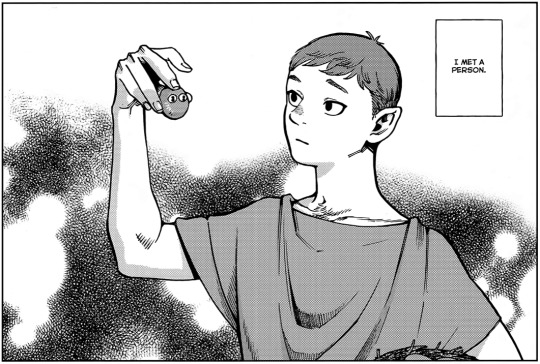
They seem to have characteristics from several of the human races together, and some of them even seem to have fur (like demi-humans?)
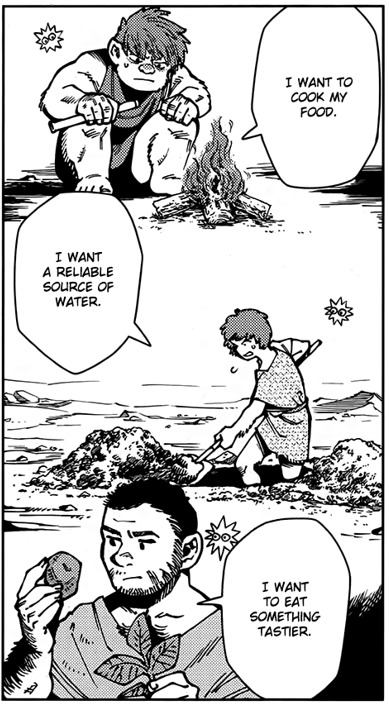
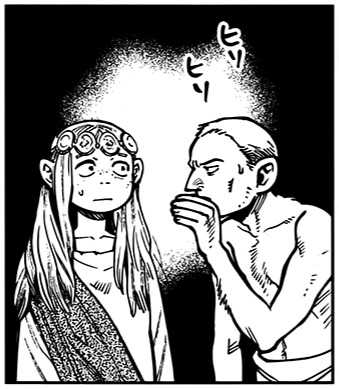
It's even implied that the lifespan differences and physical differences (the two asking for muscles and using magic in the background) were due to the Demon granting wishes
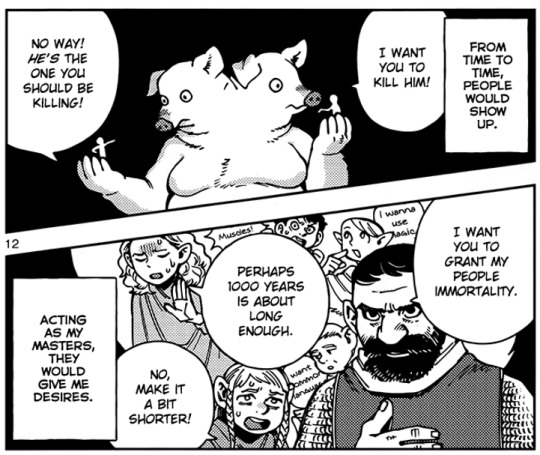
I did notice this part but I didn't realize this was probably part of the source of the race differences rather than the races already being different and wishing for different things.
So at some point the human races might have been even more closely related, before a powerful being influenced their evolution.

#nothing came off rude! i just have both kabru and laios brand autisms where i'm super interested in monsters AND sociology#so dungeon meshi is like highly personalized drugs to me#dungeon meshi spoilers
7K notes
·
View notes
Text
“Yet there is no denying the growth of the threat to women, as phallus-worship swept the world from around 1500 B.C. The accumulated force of men's resentment of women, their struggle for significance and the recognition of the male part in reproduction had brought an irresistible attack on women's former prerogative.
[...]
What this meant for women may be illustrated by the story of Hypatia, the Greek mathematician and philosopher. Trained from her birth in about A.D. 370 to reason, to question and to think, she became the leading intellectual of Alexandria, where she taught philosophy, geometry, astronomy and algebra at the university. She is known to have performed original work in astronomy and algebra, as well as inventing the astrolabe and the planisphere, an apparatus for distilling water, and a hydroscope or aerometer for measuring the specific gravity of liquids. Adored by her pupils, she was widely regarded as an oracle, and known simply as "The Philosopher" or "The Nurse." But her philosophy of scientific rationalism ran counter to the dogma of the emerging religion of Christianity, as did her womanhood and the authority she held. In a terrorist attack of the sort with which women were to become all too familiar, Cyril, the patriarch of Alexandria in A.D. 415, incited a mob of zealots led by his monks to drag her from her chariot, strip her naked and torture her to death by slicing her flesh from her bones with shells and sharpened flints.
Hypatia's infamous murder signified more than the death of one innocent middle-aged scientist. In Cyril and his bigots, every thinking woman could foresee the shape of men to come. The aggressive rise of phallicism had revolutionized thought and behavior, but it was not enough. Domination was not absolute, systems were imperfect, there was still too much room to maneuver—control could not be based on an organ that men could not control. There had to be more—an idea of immanent, eternal maleness that was not physical, visible, fallible; one that was greater than all women because greater than man; whose power was omnipotent and unquestionable—one God, God the Father, who man now invented in his own image.” - Who Cooked the Last Supper? The Women’s History of the World, Rosalind Miles
78 notes
·
View notes
Text
HOMILY for 4th Sun of Advent (Dominican rite)
1 Cor 4:1-5; Luke 3:1-6

God is great! And because God is great, he does not need to flaunt his power. It’s human beings, who are little-minded and whose thrones are unstable, and whose authority is fallible, and whose empires change and fall who have to put on displays of power. Hence, the third chapter of St Luke’s Gospel, which actually follows on from the account of Christ’s birth as a vulnerable baby in Bethlehem, opens with a list of important-sounding titles and names.
Tiberius is Caesar, the Emperor, and he has reigned for some fifteen years. And yet, he would die in AD 37, smothered to death in his own bed, with the mob threatening to throw his body into the river, which was how criminals were punished. Pilate was the imperial governor of Judaea who commanded about 3000 soldiers. And yet, in AD 39, he would be ordered by the Emperor Caligula to kill himself, a common form of execution for Roman aristocrats. Herod, Philip, and Lysanias were tetrarchs, and each ruled a third of the kingdom of Israel, puppet-kings of the Roman empire. Each fell from imperial favour, and were exiled or killed. These were the worldly powers of the time of Christ, and they controlled the known world. The other two names that are mentioned – Annas and Caiaphas – are the Jewish religious powers of the time, but we do not know much about them. In fact, if the Bible didn’t mention them, their names would have been forgotten. And all this tells us how temporary and illusory human power is; how changeable our human circumstances are; and how futile the political struggle for power can be ultimately. For all those so-called powerful men fell into nothingness and knew only a criminal’s death, infamy, and exile.
Juxtaposed beside these men who were great in the eyes of the world is one John son of Zechariah; a common name in Jewish circles. He did not live in a palace nor wear silks and jewels. He lived in the wilderness, in the desert, and he wore a rough, smelly, camel’s skin. In short, here was a man who could have been mistaken for an infamous criminal, and who lived as though he were in exile; a man without power and who might well have been forgotten.
But one fact changed all that. St Luke says: “the word of God came to John”. God, who is great, can make us great. And indeed, God’s greatness is shown in the fact that he doesn’t need powerful men to do his work. Instead, he chooses the small, the humble, the unnoticed, the unwanted, those despised by the world. Which is why the word of God came to John. And the name ‘John’, which we know the angel Gabriel had revealed to his father Zechariah, means ‘God has shown his grace and favour’. This name says it all: John is remembered, he is truly great – no matter how badly the world treated him – because God has shown his grace, his favour, his goodness to John. Hence, the word of God came to John. For to receive God’s Word – to hear it and to be taught by it and to live according to God’s Word – is to receive God’s grace and blessings.
However, it isn’t sufficient for John to receive God’s word. He has to respond and do as the word of God tells him. Which is why St Luke says that John “went through the whole Jordan district proclaiming” God’s word, according to what is written in the prophet Isaiah. Hence, because John is faithful to God’s word and he lives according to God’s word, therefore God blesses him, favours him, and makes him great. John becomes great, not in the eyes of the world – after all, he doesn’t become ruler of Judaea or become the Emperor – but he is great in God’s sight, and God upholds him. And this is true greatness since God alone is great, and he is always faithful to those who seek him, and who love him, and serve him. As St Paul says to the Philippians, those who receive God’s word and deepen their love for God’s word will “reach the perfect goodness which Jesus Christ produces in us for the glory and praise of God.” This is true greatness: becoming good through God’s power and grace as St John the Baptist was.
Now, you and I, as baptised Christians, as a chosen people who are called together to church every Sunday (at least) to hear the word of God, are also destined for the greatness of St John the Baptist. For the Word of God has also come to you and to me: Christ has come and spoken to us, through the Scriptures that we hear every Sunday. And indeed the Church wants us to read the Scriptures daily even. Hence a plenary indulgence can be gained if we read the Scriptures for at least half an hour; otherwise a partial indulgence if we meditate on the Scriptures for a shorter duration. Moreover, Christ, the living Word, has has come to teach us, through the Sacred Liturgy; through the Magisterium of his Body the Church; and Christ gives us a share in his divine life through the grace effected by the Sacraments. Hence, because the word of God has come to you and to me, then, no matter how little or insignificant or despised we might be in the eyes of the world; or no matter how unworthy or lowly or even unloved we might feel, we know, from the example of St John and the words of the Scriptures, that God, who is great, desires to make us great!
Therefore, as Our Lady declares in her Magnificat, and the Church echoes in her sung prayer every evening, those whom the world thought to be important and great, high and mighty princes, have all been humbled and brought low; exiled and executed. But we, who should have deserved death for our sins have, by the love and grace of Christ, been forgiven and now share in Jesus’s royal dignity through our baptism.
In the ancient world, royalty travelled on royal roads which took them directly to the king’s city. So, too, we, who have become royalty because of Jesus Christ, can travel directly on the highway to the heavenly city of God the true King. “Every valley will be filled in, every mountain and hill be laid low, winding ways will be straightened and rough roads made smooth”, says St John the Baptist. A highway shall be built to take us straight to God and to receive his salvation, so that we can be made great and share in God’s glory.
How? What do we need to do to take this highway to heaven? St Luke tells us: John proclaimed “a baptism of repentance for the forgiveness of sins”. Repentance, therefore, takes us from our sinful exiled, death-row circumstances to saved, alive-through-grace circumstances. If we repent, therefore, we shall become great; great like St John the Baptist. The consequences of a sinful life, a life without repentance, sadly, is plain to see in the fates of those powerful important men named in the Gospel. Their sinful lust for power, wealth, pleasure, only led to their downfall and ruin. So, you and I are called today, this final Sunday of Advent, to juxtapose our own lives against theirs. Like St John the Baptist, the word of God has come to us: God has called us to become great; he gives us his power and grace so that we can rise up from the exile and folly and death of sin to eternal life with Jesus Christ. The word of God has come to us to save us. So, by God’s grace, let us repent – turn away from the wrong ways and false roads of this world, and take the royal highway straight to the Lord; right into the heart of the God who loves us and became a little baby for us. Thus we know that God is great. For God’s greatness is revealed in the depths of his humility. It is this littleness of God that we ponder at this time, for through his littleness we are made great.
So Blessed Jordan of Saxony, the successor of St Dominic as Master of the Order said: “I send you a very little word, the Word made little in the crib, the Word who was made flesh for us, the Word of salvation and grace, of sweetness and glory, the Word who is good and gentle, Jesus Christ and him crucified, Christ raised up on the cross, raised in praise to the Father's right hand: to whom and in whom do you raise up your soul and find there your rest unending for ever and ever. Read over that Word in your heart, turn it over in your mind, let it be sweet as honey on your lips; ponder it, dwell on it, that it may dwell with you and in you for ever.”
Amen.
3 notes
·
View notes
Text
Marvel HC Complication
So this is all the HC’s for Ella for her Marvel verse (most are geared towards MCU). Most of these were created pre-infinity wars but still fit in the world bc its more about her background and how if affected her. These are summarized as the posts are super detailed that is more stream of conscious. Note: This may change after tfatws if we get more about HYDRA from Bucky.
Ella basically sleeps in a blanket and pillow nest on the floor, beds are way too soft for her even the ones that you can make super firm. Before HYDRA found her she was sleeping on the grass outside, she slept basically on the floor when she got there because it was more comfortable than the “bed” they gave her.
Ella’s powers were manipulated in a way technically her powers were not suppose to work- yes her powers healed her but not to the extent they do now and they weren’t intended to be used on others that way. That means that she technically is at her weakest, even though she seems strong and dangerous as she can utilize her powers rather effectively and quickly. It also requires her to use more fuel.
This also means that her powers always run for 2 way- to heal or in an “up keep” manner to keep her younger longer (the latter wasn’t ingrained in her until later around 21 yrs old)
Ella needs to eat to fuel herself as it uses a lot of her powers, but not as quickly or as often as she will probably make it appear around others. She is just paranoid and wants to be at 100% all the time, and also it will make people think she needs to fuel more often than not and will allow her an advantage by deceiving them. She also eats a lot because she exercises a lot and like those who exercise a lot she needs to eat to keep up with losses.
Ella struggles with basics or human emotions and tact, because unlike a mission what is the point of having to bother with these things?
Ella’s powers were not weakened by mistake, HYDRA knew they could use her more efficiently by being an assassin and spy, keeping her off the grid. (They kept everything about her off any files since they didn’t have to account for her in birth records etc, she normally dealt with high level personnel only. Though doctors she dealt with detailed and recorded her torture for themselves).
HYDRA was obsessed with making super soldiers, and while they found Ella couldn’t help create them with others, they could create one in her. They realized with her height projections and stature, she’d never be quite as strong and they didn’t want her to be quite as muscled- so she is lean and looks weaker than she is but they focused on her speed, agility, flexibility instead. She is still inhumanly strong, she has a fast metabolism about 3.25 times faster, she is immune to almost every poison or drug, doesn’t get drunk, she is super fast, very flexible and very quiet.
Ella’s childhood was basically torture - which was called power and strength training. Once she leaves she suffers from nightmares and night terrors, she struggles to sleep in general as she struggles with the fact that what happened to her has caused psychological damage. This is a hug struggle for her because in ways she still sides with some of HYDRA’s ideals- or the ones she was brought up to believe and has a hate/feel indebted to relationship as they did raise her- took care of her, fed her, made her someone to be feared.
When Ella uses her powers as they should be used, she will be incredibly strong once she practices with it. At first, it will be exceedingly draining on her and she will need to fuel up quite a bit, once she gets use to using them they aren’t draining pretty much at all.
- When she uses her powers correctly her irises, which are blue, glow an almost neon blue and has gold within them (Think like a blue and gold bath bomb), and a fine blue and gold swirling colour, covers her hands like a glove, and encases whatever element /object she is utilizing until she stops.
Ella is technically very rich, when she left she transferred money from HYDRA (Billions) for her services rendered and for her to leave them alone mostly. She doesn't live to spend them lavishly and has them in various bank accounts.
Due to the torturous nature of her upbringing the only positive acceptable means of touch to Ella is more sexual in nature, and she very much dominates and control the scenario- male or female. She is very much a top seeming person sexually, as well as dominate. In reality, she is very touched starved and is a cuddly person. Once she trusts someone (Which I wish you luck) fully and completely - she will be touchy. She will cuddle and hold hands and rest ehr head on your shoulder and hug and nuzzle and caress. She will also love being touched- but due to the amount of trust needed anything like massages and hugs being given willingly or allowing will most likely be with a romantic partner or a twin flame. Friends she’d probably let her hair be played with, or be comfortable with them hugging her or more casual touches.
If you call Ella the villain, the criminal, the hero there are just words to her, or if you call anyone else those terms. She really doesn’t care for any of those terms and she doesn’t let those terms bother her or define her. She doesn’t care about being ‘the hero’ or ‘the villain’ she prefers to do what she thinks is right or best- regardless of what fallible and bias governments have decided. She doesn’t claim to be perfect or always right, but she’d rather make her own mistakes than make mistakes of others all in the name of being ‘the hero’ so if that makes her ‘the villain’ of the story then she quite frankly gives zero figs.
1 note
·
View note
Photo
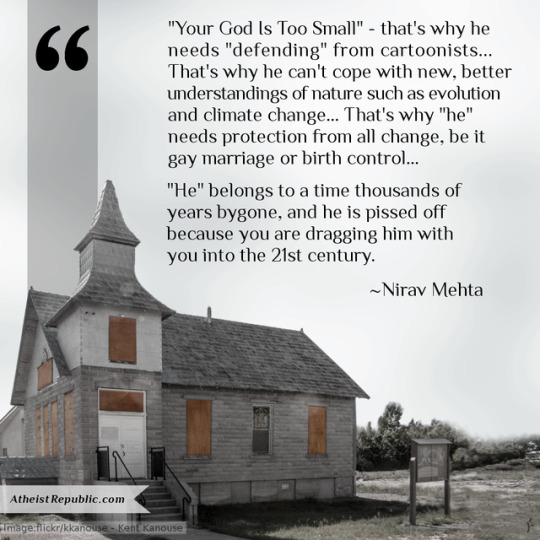
"Your God Is Too Small" - that's why he needs "defending" from cartoonists... That's why he can't cope with new, better understandings of nature such as evolution and climate change... That's why "he" needs protection from all change, be it gay marriage or birth control...
"He" belongs to a time thousands of years bygone, and he is pissed off because you are dragging him with you into the 21st century.
-- Nirav Mehta
He needs to hide behind fallible, sinful, imperfect humans to fight his battles for him, with ignorance and fallacies as their only weapons.
Your god is pathetic and unimpressive.
#Nirav Mehta#your god is too small#blasphemy laws#blasphemy#religion#god is a coward#religion is a mental illness
117 notes
·
View notes
Text
Why Many Fans Just Don‘t “Get” Ben Solo (I think…)
I already wrote my personal, lengthy opinion about why I don’t want Ben Solo to die, in case someone wants to read it: Why I Don’t Want Ben Solo to Die
Over and over, I have to realize that many people simply don’t like the sequel trilogy because they don’t get why Ben Solo / Kylo Ren is so desperately far off from every villain or hero we knew in both the classic and prequel trilogy.
If he is a villain, why is he so often unhinged, doubtful, afraid of what he’s doing?
If he is a hero, why isn’t he handsome (like his father, or grandfather, or uncle)? Why isn’t he swashbuckling? Why isn’t he cool and strong and brave?
He’s unusual, I admit it. But I think more and more that that’s the whole point.
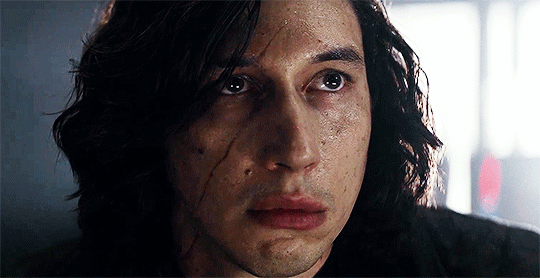
Ben Solo is the protagonist of the saga’s third instalment: until now we saw the story of the grandfather who was a hero and then became a villain, and then the story of the son who was a humble farm boy and became a hero, both as the Force willed.
Anakin Skywalker, as we get to know him, has all prerequisites for being an extraordinary person already at age nine. He often manages tasks which seem impossible. Which is logical - he is the natural child of the Force.
Luke and Leia are the children of the greatest Jedi of his time and of a senator (and ex queen). Both these figures are heroic to the point of unreachable - there seems to be nothing they can’t do when they’re together. It is only logical to assume that the children of these two can be nothing but heroes.
But Ben Solo? He is the child of a princess and a scoundrel. How is he supposed to be a villain or a hero? It’s not possible by all logic that he should be either.
We have seen Ben in his interactions with Rey, when the Kylo Ren persona stepped back for a few moments. Yet many viewers have not recognized Ben Solo, to them he is always Kylo Ren, the wannabe Vader, the whiny sissy etc.
Why?
Because he’s neither here nor there. Ben is not beautiful but neither is he ugly; he has done a lot of terrible things but he is still capable of good feelings; at times he can control his fears (he eliminates Snoke in cold blood), at other times he is overwhelmed by them (he is terrified of Luke).
Who is the young man Rey was talking to, the one she got to know intimately, the one she was perhaps already falling for (this is open for interpretations), but with whom she undoubtedly formed a bond of mutual trust?
Han’s and Leia’s son is, simply put: a good guy. An average guy, the boy next door you could say. His parents wanted him to become a hero like his uncle but he failed, Snoke blackmailed him to become a villain like his grandfather and he failed again.
Why?
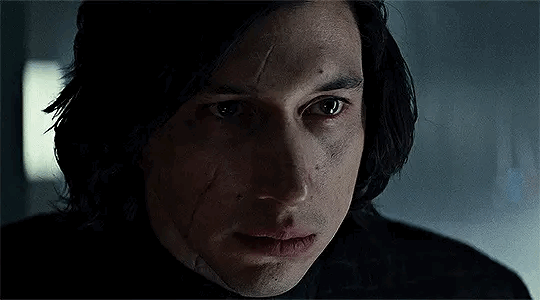
Because neither of these are his places in life. Ben is simply an average person, fallible but kind, confused but ultimately well meaning. That’s what he was meant to be by the will of the Force, and what his environment did not allow him to become. Ben was overburdened with a task far too heavy for his shoulders from birth, pushed into becoming someone he never was and never wanted to be. (Besides I have watched a few other movies with Adam Driver and I never saw him interpret the role of the Byronic hero. As far as I can judge, in one or the other variation he always is the “boy next door”.)
I don’t expect Ben Solo to “come back to the light” in TROS. He will find his own way, but not as a hero; no matter how much he regrets, no matter how much good he still might do, he will always be a patricide. I foresee no laurel wreath, no cheering crowd and no prince’s crown for him.
But I doubt that Ben wants any of those. What the vulnerable, funny-looking, shy son of Han and Leia wants most is to be loved and to belong. He will be the hero of his own narrative by being neither hero nor villain, but human.
To make the Dark Side of the Force win, a villain was needed. To make the Light Side win, a hero was necessary. To create balance, we need a human.
And that is what was staring into our faces right from the moment he took off his mask.
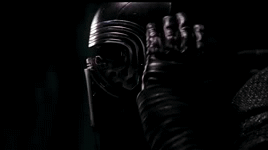
Thank you for this beautiful narrative, George. 😊
#star wars#bendemption#ben solo#kylo ren#george lucas#leia organa#han solo#anakin skywalker#padme amidala#episode IX
35 notes
·
View notes
Text
y’all i saw terminator: dark fate!!!!!!!!!
GOD i loved it. i think i’ve admitted before that the only way i really rank exciting plot points in movies is by how much i anticipated them/wanted them to happen, and terminator: dark fate did NOT disappoint. fuck every writer or director who makes weird shit happen in their stories just to give the audience a story they couldn’t possibly have anticipated. (cough avengers endgame cough.) sometimes the best ending is one you can see from ten miles away, because that means it’s been set up EFFICIENTLY.
obviously, i think the new terminator did that. there were a few things i wanted to happen that didn’t (mostly regarding the life of one or two key characters), and a few things i legitimately didn’t see coming that i really liked, but ultimately the story was solid, awesome to watch, and very faithful to the original. i haven’t seen any of the sequels past judgement day, and i have no plans to change that anytime soon (lmao), but i’ve heard that it discounts all continuity past the second one, and that’s completely fine by me. the actors were great. LINDA HAMILTON was great. and i am sexually attracted to old soft arnold schwarzenneger. 😔
i was debating on whether or not i should make a separate post to talk about the time travel in the terminator franchise or if i should just go crazy go stupid and lump it in with my review and ultimately i think it can just go here, because i have some things to say re: the way it ties back to the originals.
personally i think the neatest example of time shenanigans in the franchise comes from the very first movie. that one sets up time travel in their universe as very “you already changed the past,” insofar as, without the time travel elements, there is the very real sense that the future the terminator came from would never have existed. kyle reese, from the future, becomes the father of his superior officer john connor. without the time travel, there would be no human resistance for skynet to fear. not only that, when the terminator’s arm is left behind intact, even after sarah destroys the machine, they set out the idea that skynet itself was DEVELOPED FROM THE TERMINATOR’S TECHNOLOGY, so if there was no time travel, there was no skynet, and no apocalypse... etc. at the end of the movie, the picture of sarah that kyle comes back with is taken by a child at a gas station, and it seems like a clue that everything is happening on track. sarah will give birth to john connor, the machines will rise up, the resistance will rally, time travel will ensue. the events of the first movie are a closed time loop, and ultimately, i find that really satisfying.
However.
from a narrative perspective, i think the changes in those time travel mechanics are super interesting.
basically, in judgement day, there’s still some implications that the timeline is a closed loop--the terminator’s hand is actually shown to be the basis of what will become the skynet computer, which is being built right then and there. the apocalypse could indeed be on, and everything seems fixed. then, though, they find the creator of the computer, and miles bennett helps them to destroy his work in horror at what he will create. skynet never happens. they change the future.
by dark fate, that ability to change what is “written” becomes not only a plot point, but a sort of rallying cry. the skynet apocalypse is officially off--now the dark future is controlled by a very similar breed of computer known as legion. sarah’s efforts changed the future, permanently. there’s the feeling perhaps that the future can only be changed to an extent (the skynet apocalypse being canceled, but replaced by a very similar robo-hell, for example--almost like the timeline is trying to set itself right), but that feeling is tested and challenged as the movie progresses. in that sense, dark fate is the full culmination of the trendline that their “trilogy” represents: sarah’s fate was sealed in dark fate, but with john’s influence in judgement day, things were officially set off course. dark fate represented dani’s turn, and she took everything into her own hands--she personally stood up and refused to run, refused to let the bad future win out, refused to take things lying down. sarah felt a kinship to her, based on the position that she found her in, but it’s like she realizes--dani is not sarah. sarah’s realization is that “she’s john,” which is closer--she’s the leader of the resistance, humanity’s only hope, but i think the message is pretty clearly telling us that she’s not john connor either--she’s dani ramos.
and she fucking OWNS.
one thing that i was a little iffy about at the start of the movie was the “white savior” thing. i don’t think that was an unfounded reservation to have--based on the formula from the first movie, a terminator is sent back to kill, and a hero is sent back to protect. this time, the “hero” is a white girl cyborg named grace, while the character in danger, who the movie clearly wants you to think is in the same boat as sarah connor, ie the mother mary role, literally important not for her own self but for her womb, is a mexican woman. that could have reached unfortunate implication levels like hella fast, but honestly (and i will disclaim this by adding that i’m white, so if you felt differently about it i would appreciate hearing why), i think the rest of the movie subverted that pretty beautifully. for one thing, grace being fundamentally human underneath her augmentation meant that she wasn’t an unstoppable machine ready to continue on until her metal frame was torn to shreds. she was a BADASS, obviously, and in the first fight, grace did prove herself a worthy successor to the “uncle bob” terminator in t2 with her kickass skillz (sorry kyle reese you’re just not that cool), but soon after that we got to see grace’s limits. if it hadn’t been for sarah connor, grace’s plan on the bridge finally boiled down to “when the terminator starts to kill me, run.” soon after that, grace’s power is shown to be fallible even more thoroughly when she hits her limit and starts to convulse, a byproduct of her augmentation. grace can do more than what a human can do, but she can’t do it forever like a machine could. very quickly in the movie, the tables were flipped, and even though grace came back through time to protect dani, dani was the one who had to take over the driver’s seat (despite never having driven before), and the one responsible for getting grace to medicine so that she could be resuscitated. and all that was BEFORE the big reveal.
a note: there were two scenes in pretty quick succession in this sequence that made me sob. the first of these was the death of dani’s brother diego, because in his last act, he was reassuring his sister that he was okay, despite being impaled by a metal pole. that line gave his character some depths that i hadn’t expected, and it really made dani’s pain after the car went up feel palpable. diego didn’t get a lot of screentime, but we saw him flirt lamely with a neighbor, we saw him dream of internet fame, we saw him joke at the factory even as his job was being replaced. we saw how much dani cared about him when she told him to take her job while she sorted out his replacement by machine parts. their relationship was a solid brick in the movie’s foundation, and his loss felt a lot more real than many comparable losses in movies. you know that whole “show, don’t tell” adage? they didn’t have to tell me that losing diego (and her father) was like a knife in dani. i saw that for myself. the second scene was at the pharmacy, when the employees and the other customers reached out to help grace even after she and dani had both lashed out and threatened them with the gun in fear of what was happening. y’all ever get emotional over the way that people are essentially good and will help each other when they can? god i fucking love that.
anyway, the reveal. the reveal was awesome.
i started suspecting that dani wasn’t the mother of humanity’s last hope, but rather, humanity’s last hope herself, during the conversation on the train telling us exactly the opposite. sarah makes some assumptions and projects her experience onto dani, telling her flat out that she’s pretty much a walking incubator for humanity’s last hope. there’s a sense that sarah might be bitter about having that role handed to her, and perhaps even more so because it was then taken away--she lost the son that she risked everything for, fought two terminators for, and for nothing: for some machines in a future that no longer existed. in that scene though, crucially, grace never says anything to confirm sarah’s assumptions. the one character with knowledge of the future doesn’t impart it, and it shows. sarah knows things that dani doesn’t simply because it’s not her first rodeo, but she’s also wrong sometimes, too. again in the kitchen later, the “carl” terminator asks about grace’s mission, but she doesn’t share it or give any information on who dani is going to turn out to be. the absence of information can often be an answer all in itself, and the reveal had some EXCELLENT groundwork throughout the movie--both in grace’s actions and in the brave and heroic actions of dani herself.
dani’s nature and grace’s past being revealed in the plane was one of the best scenes in perhaps the entire franchise. i said i sobbed at those scenes i outlines before, right? yeah, that was nothing to how hard i was crying and also cringey stimming during the reveal. we got to see a peek of dani ramos some twenty years in the future, and she’s incredible. she’s fearless, she’s tough, but crucially, she’s still kind. she takes no shit, but she not only saves a child’s life, but she offers a new one to the thugs who were chasing her. in just one scene, the way that dani bands a resistance together is obvious: she’s the best of us, and she uses that for good.
god, i love dani ramos.
the way that ultimately, dani takes the “hero” role over for herself (much like sarah did, honestly) and the way that we get to see grace’s weaknesses make them a very balanced pair. they’re both badass women in their own right (hell, sarah is, too), and they counter each other excellently. grace is augmented, and has physical capabilities that dani can’t match. at the same time, though, dani is willing to make risks that grace isn’t, because while grace’s concern rests on the fate of one woman, dani wants to find the best outcome for everyone--including herself, but not ending there. grace is willing to drop dani at the bottom of a mineshaft, if that’s what it takes to keep her safe. dani is willing to sacrifice her safety to face the confrontation that’s looming, because that’s what it takes to move forward.
i think one of the coolest things about the movie is that both grace and sarah come into the action with more experience in combat than dani, and more knowledge about the situation than dani, but ultimately the movie shows that they aren’t infallible, and there’s never a moment when dani is punished for naivety or made to feel stupid because she wasn’t as informed as them. both grace and sarah, in fact, are openly shown to be wrong about dani in different ways--grace knows who she’s going to become, intimately, but that closeness makes her too reluctant to put dani near the front lines, choosing to run indefinitely from the terminator rather than face it head on and use every advantage they can get to beat it. sarah, meanwhile, respects dani’s agency more, but in a way she sees past her at the start of the movie, dismissing her importance in a way that reads as sarah dismissing her own--she’s attacking herself and using dani as a proxy, but sarah’s wrong, because dani isn’t her. i love how both grace and sarah are good characters, and they’re both doing what they think is necessary and right, but they’re allowed to be wrong and misguided. ultimately, if it wasn’t for dani’s own agency and choices, the terminator would not have been defeated, and there would be no hope for subverting the bad future everyone is waiting for.
fate, believe it or not, is a very present theme in dark fate. obviously, i talked earlier about how this movie is the culmination of the “you can’t change the future” -> “you can change the future?” -> “you can change the future.” chain of events represented in the good terminator movies that i will acknowledge, but it’s more than just that. through the character of the “carl” terminator, we also get to see the blatant subversion of one’s nature for the better, and that was just. really epic. ngl.
in terminator 2, i enjoyed how john connor was protected by the reprogrammed terminator “uncle bob,” but i was a little disappointed by the execution. having uncle bob be a protector to john was exactly what i wanted, but the explanation that he had been programmed to do so rubbed me a little the wrong way. what i didn’t realize until i watched dark fate was that this pinged as wrong because dark fate gave me what i wanted: a terminator that didn’t change sides because he was taken down and forced to change, but rather, a terminator that actually made a conscious decision to be better because of what he observed in humanity. carl saw a familial dynamic and realized that he had taken that from sarah, and reached out to her, giving her a purpose like his family had given him a purpose, because he chose to. and that was the sexiest thing he could have done.
can you tell i LOVE what they did with the terminator. his arc and sarah’s were such awesome continuations for sarah’s general history and the progression of terminators played by arnold schwarzenneger. part of me was hoping for an ending where we saw sarah and carl drive off together, waving to dani and preparing to live out the rest of their years saving the future. yeah, well, we didn’t get that, but there were several scenes that hinted at forgiveness from sarah (an almost impossible feat given how she felt and what she lost) and trust between the two of them, and i loved that too.
dark fate was a good movie, y’all. it was so good.
there’s probably a million other things that i could talk about going down this vein, but this post is already a monster. i’ll just sign out by saying: one last thing i thought was epic and cool was how the protagonists cross the border from mexico into the us and at no point is such an action demonized; in fact, it’s necessary for them to reach essential aid in the form of carl, and the man who facilitates the action, dani’s uncle, is never treated amorally or like a criminal. i know, i know, the bar is on the fucking floor, but in the political climate we’ve got, for a blockbuster to take that stance felt like a pretty solid statement to me.
also, i liked the terminator’s line about texas. watching that in a theater in texas, i must report that it got the biggest audience reaction out of any line in the whole movie. folks, there were wolf whistles. ciao.
#terminator#terminator: dark fate#sarah connor#dani ramos#carl terminator#grace terminator#i feel like i like the movie more now than i did when i started typing this#don't get me wrong it's always been epic and sexy but while i was ruminating on it i realized things i didn't even know i felt#terminator dark fate is the gift that keeps on giving i must see it again
13 notes
·
View notes